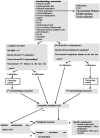Systematic preoperative approach for bariatric surgery, perioperative results, and economic impact
- PMID: 39444955
- PMCID: PMC11496121
- DOI: 10.3389/fpubh.2024.1439948
Systematic preoperative approach for bariatric surgery, perioperative results, and economic impact
Abstract
Introduction: Obesity is a complex systemic condition, involving numerous anatomical and metabolic changes. Therefore, a comprehensive preoperative assessment is essential for each patient contemplating bariatric surgery.
Objetive: This study presents the findings of a proposed protocol designed to streamline the pre-anesthesia consultation process. Our aim was to compare the efficiency and costs of consultations guided by the protocol with those conducted without a specific strategy. The secondary outcomes assessed included postoperative (PO) length of hospital stay and surgical duration.
Matherial and methods: We conducted a retrospective cross-sectional analysis involving 206 clinical cases. Statistical analyses, including the chi-squared test, Student's t-test, and Mann-Whitney U test, were utilized based on the type of variables.
Results: The results showed a significant reduction in the costs, pre-anesthesia consultation duration, time spent in the recovery unit, and the need for referrals. However, no statistically significant differences were observed in the delay before surgery and length of hospital stays, measured in days.
Conclusion: This algorithm offers a promising approach for optimizing perioperative management in bariatric surgery, demonstrating its effectiveness in cutting costs and reducing the need for referrals.
Keywords: anesthesia; cost control; economics; effectiveness; surgery.
Copyright © 2024 Freire-Moreira, Sanchez-Conde, Sousa, Garrido-Gallego, Rodríguez-López, Juárez-Vela, Bragado, Carretero-Hernández, Vargas-Chiarella, Calderón-Moreno, Lorenzo-Gómez and Vaquero-Roncero.
Conflict of interest statement
The authors declare that the research was conducted in the absence of any commercial or financial relationships that could be construed as a potential conflict of interest.
Figures
References
-
- Jensen MD, Ryan DH, Apovian CM, Ard JD, Comuzzie AG, Donato KA, et al. 2013 AHA/ACC/TOS guideline for the management of overweight and obesity in adults: a report of the American College of Cardiology/American Heart Association task force on practice guidelines and the Obesity Society. Circulation. (2014) 129:S102–38. doi: 10.1161/01.cir.0000437739.71477.ee - DOI - PMC - PubMed
MeSH terms
LinkOut - more resources
Full Text Sources
Medical



